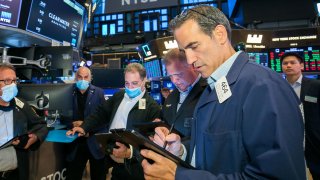
The U.S. 10-year Treasury yield hovered around 1.73% on Wednesday after December's consumer price index came in at a hefty 7% annual increase.
The yield on the benchmark 10-year Treasury note fell by 1 basis points to 1.734% in afternoon trading. The yield on the 30-year Treasury bond rose about a basis point to 2.085%. Yields move inversely to prices and 1 basis point is equal to 0.01%.
The December consumer price index, a key inflation measure, increased 7%, according to the Bureau of Labor Statistics. On a monthly basis, CPI increased 0.5%. Economists expected the consumer price index to rise 0.4% in December, and 7% on a year-over-year basis, according to Dow Jones.
The annual move was the fastest increase since June 1982.
Get DFW local news, weather forecasts and entertainment stories to your inbox. Sign up for NBC DFW newsletters.
Excluding food and energy prices, so-called core CPI increased 5.5% year over year and 0.6% from the previous month. That compared to estimates of 5.4% and 0.5%.
The jump in inflation may be priced into the bond market. The yield on the 10-year Treasury ended 2021 around 1.5% and has gained more than 20 basis points in the first two weeks of the new year.
Michael Gapen, Barclays chief U.S. economist, said on "Squawk on the Street" that the 10-year yield would likely move toward 2% later in the year but should pause in the near-term.
Money Report
"We think is that what you saw in the first part of this year, that big move higher in the long-end of the curve, was markets taking on board that not only are we going to get rate hikes from the Fed but we are also going to get balance sheet runoff," Gapen said. "So we think things are fairly priced where they are at the present."
The Federal Reserve has signaled that it is expecting to end its emergency asset purchases and start hiking rates in the first half of 2022.
Fed Chairman Jerome Powell said in his confirmation hearing before the U.S. Senate on Tuesday that interest rate hikes, along with other reductions in the central bank's support for the economy, would be needed to control inflation. He said that the U.S. economy was healthy enough and in need of tighter monetary policy.
Timothy Horan, the chief investment officer for fixed income at Chilton Trust, said that a hot inflation report was unlikely to further change Powell's decision making at this point.
"He's not going to be rushed. And that's a good thing given what the uncertainties are with omicron, with the virus, with the labor force as it is as we saw in that [December] jobs report," Horan said.
Auctions were held on Wednesday for $40 billion of 119-day bills and $36 billion of 10-year notes.
— CNBC's Patti Domm and Jeff Cox contributed to this market report.






